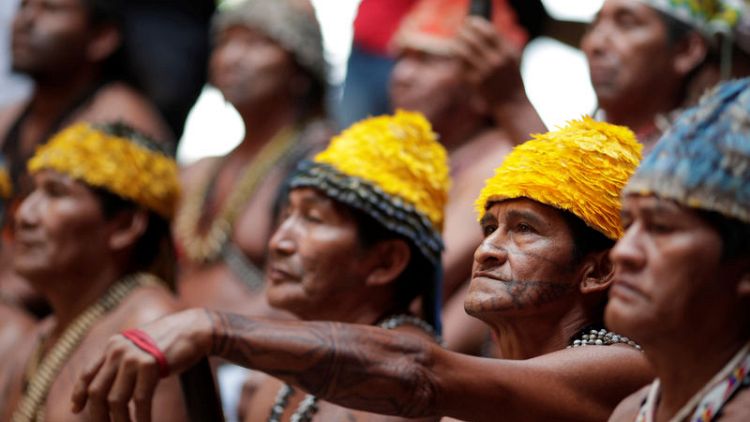BRASILIA (Reuters) - Munduruku indigenous people led by 15 tribal chiefs blamed Brazil's President Jair Bolsonaro on Thursday for increased illegal mining on their reservation lands in the Amazon rainforest.
They also urged his government not to restart plans to build hydroelectric dams on the Tapajos river that runs through their ancestral lands and is one of the largest clearwater tributaries of the Amazon.
The 50 Munduruku, including children, took a week to get to Brasilia by bus to present their complaints to the head of Brazil's indigenous affairs agency Funai, Marcelo Xavier, the group said. But Xavier sent an aide to meet them even though he was in the building, they said.
A spokeswoman for Funai did not respond to request for comment.
Bolsonaro has vowed to assimilate indigenous people into Brazilian society and raise their standard of living by allowing mining and commercial agriculture on their reservations, which most tribal leaders say will kill their cultures.
"We came to raise our voices because we are under threat. They want to legalize mining in our territory, build hydroelectric dams, ports, a railway and a waterway for soy," said Maria Leusa Kaba Munduruku at a news conference.
She said illegal logging was on the rise and wildcat miners were invading Munduruku lands in great numbers since Bolsonaro said he would seek to allow mining on indigenous reservations.
The Tapajos basin is one of the regions of the Amazon where most illegal mining is occurring, polluting rivers with mercury. Some 13,750 Mundurukus live there in 112 villages.
"Our chiefs have had threats to their lives. Whoever defends their lands today faces the risk of being shot," she said.
(Reporting by Anthony Boadle; Editing by Bill Berkrot)


